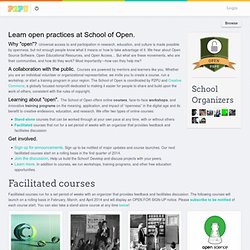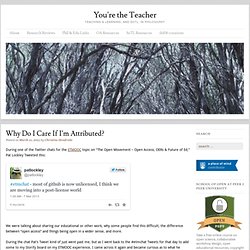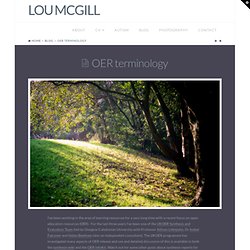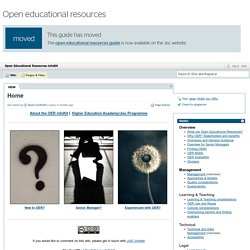

School of Open. Learn open practices at School of Open.

Why "open"? Universal access to and participation in research, education, and culture is made possible by openness, but not enough people know what it means or how to take advantage of it. We hear about Open Source Software, Open Educational Resources, and Open Access… But what are these movements, who are their communities, and how do they work? Most importantly—how can they help me? A collaboration with the public. Learning about "open".
Stand-alone courses that can be worked through at your own pace at any time, with or without others Facilitated courses that run for a set period of weeks with an organizer that provides feedback and facilitates discussion Get involved. Sign up for announcements.
Trouver des REL. Badges. Why do I care if I’m attributed? During one of the Twitter chats for the ETMOOC topic on “The Open Movement – Open Access, OERs & Future of Ed,” Pat Lockley Tweeted this: We were talking about sharing our educational or other work, why some people find this difficult, the difference between “open access” and things being open in a wider sense, and more.

During the chat Pat’s Tweet kind of just went past me, but as I went back to the #etmchat Tweets for that day to add some to my Storify board on my ETMOOC experience, I came across it again and became curious as to what he meant. Thus started a fairly long conversation about copyright, licenses, public domain, and more. You can see it all here. There’s a lot I’d like to think about further in this conversation, but what is really standing out for me at the moment is this: Why am I using a CC-BY license on my work?
Why not make one’s work public domain instead of using something like CC-BY? “Attribution,” by fotogail (see below) Help me out here? OER terminology. I’ve been working in the area of learning resources for a very long time with a recent focus on open education resources (OER).

For the last three years I’ve been one of the UKOER Synthesis and Evaluation Team (led by Glasgow Caledonian University with Professor Allison Littlejohn, Dr Isobel Falconer and Helen Beetham (also an independent consultant). The UKOER programme has investigated many aspects of OER release and use and detailed discussion of this is available in both the synthesis wiki and the OER infoKit. Watch out for some other posts about synthesis reports for the latest phase (phase3) and the HEFCE OER Review, which we’ve recently been working on.
For over a year I’ve been working on a guide to help people understand the terminology around OER release, use, models and benefits and open educational practice (OEP) that aims to shed a bit of light on how the different terms relate to each other. Home. Overview Management Learning & Teaching Technical Legal JISC/HE Academy UKOER Programme UKOER tweets Going further...

Recent changes to the infoKit Cookie statement Last Cookiweek David Kernohan, a JISC Programme Manager, commented in a Guardian article last week that Open Educational Resources are a radical idea that has now become mainstream. To try and condense some of the vast amount that has been learnt about the benefits of OER releases in the past 10 years, the Higher Education Academy and JISC have developed an InfoKit. (David Kernohan) As David mentions, one section that was missing up until now is a section giving an overview of Open Educational Resources for Senior Managers.
. · OER infoKit >>> Senior Management Overview >>> Menu If you're a Senior Manager - or even if you're not - we'd love some feedback!
#h817open.